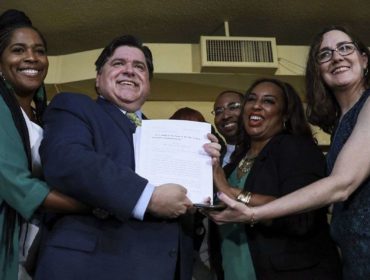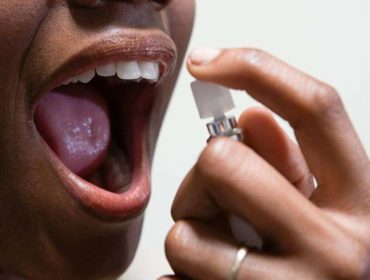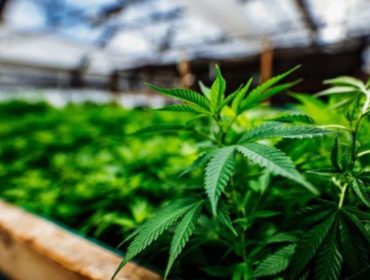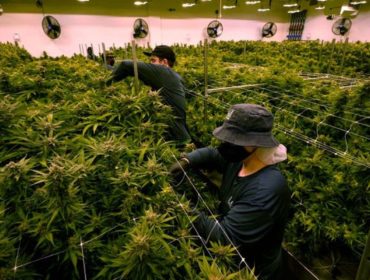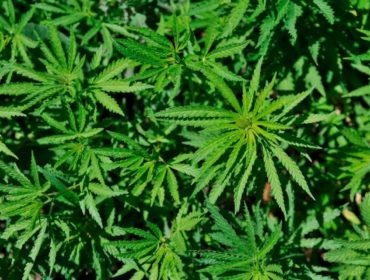A Guide To Marijuana Legalization In The United States
All you need to know about the status of medical and recreational marijuana legalization in the U.S.
Marijuana use was legal for most of human history until the early 20th century. Between 1916 and 1931, 29 U.S. states banned the use of marijuana. The Marihuana Tax Act of 1937 essentially made cannabis illegal across the U.S.
While cannabis remains illegal on the federal level, most U.S. states have legalized the use and sale of medical marijuana, and an increasing number are legalizing the plant for recreational use. Here’s the lowdown on marijuana legalization within the U.S.
Marijuana legalization in the U.S.
California, which legalized medical marijuana in 1996, was the first state to treat the legalization of marijuana as a state’s right. Now, in 2021, here is the long list of U.S. states, districts, and territories that have legalized either medical or recreational marijuana:
Alaska
Both medical cannabis and recreational marijuana are legal in Alaska. In 1998, the state’s voters passed Measure 8, a ballot initiative to allow the medical use of marijuana. In 2014, Alaska’s voters approved Ballot Measure 2, which legalized recreational marijuana.
Arizona
Both medical and recreational marijuana are legal in Arizona. In 2010, voters passed Proposition 203, which legalized medical marijuana. Ten years later, Arizona voters passed Proposition 207 to also legalize recreational marijuana.
Arkansas
Medical marijuana became legal in Arkansas following the voters’ passage in 2016 of Issue 6, which amended the state constitution to legalize medical marijuana.
California
Both medical cannabis and recreational marijuana are legal in California. In 1996, voters passed Proposition 215, a ballot initiative that legalized medical marijuana. In 2003, the state legislature adopted SB 420. This law protects physicians from being punished for recommending medical marijuana to patients. In 2016, voters passed Proposition 64, which legalized recreational cannabis.
Colorado
Both medical and recreational cannabis are legal in Colorado. Voters passed Ballot Amendment 20 in 2000 to legalize medical marijuana. In 2012, Colorado voters passed Amendment 64, which legalized recreational marijuana.
Connecticut
Both medical and recreational cannabis are legal in Connecticut. The state’s legislature passed a law in 2012 to legalize medical marijuana. In July 2021, Bill 1201 was signed into law to legalize recreational marijuana.
Delaware
Medical marijuana is legal in Delaware. In 2011, the state’s general assembly passed SB 217 legalizing medical marijuana.
District of Columbia
Both medical cannabis and recreational marijuana are legal in the District of Columbia. In 1998, D.C. voters approved Ballot Initiative 59 to permit seriously ill patients to use medical marijuana when it’s recommended by a licensed physician. But at that time, the U.S. Congress, which has jurisdiction over the federal district, voted to prevent the initiative from being enacted.
In 2009, Congress reversed that decision, allowing Initiative 59 to take effect. In 2010, the District of Columbia’s council passed L18-2010, which legalized medical marijuana more broadly. Then, in 2014, D.C. voters passed Initiative 71 to legalize recreational marijuana, too.
Florida
Medical marijuana is legal in Florida. In 2016, voters approved Amendment 2 to legalize medical marijuana.
Hawaii
Medical marijuana is legal in Hawaii. In 2000, the state’s legislature passed SB 862 to legalize the medical use of cannabis.
Illinois
Both medical and recreational marijuana are legal in Illinois. The state legislature passed HB 1 in 2013 to allow the compassionate use of medical marijuana. In 2019, the legislature voted to legalize recreational marijuana.
Louisiana
Medical marijuana is legal in Louisiana. In 2016, SB 271 and SB 280, which allow the medical distribution of marijuana, were signed into law.
Maine
Both medical and recreational cannabis are legal in Maine. In 1999, the state’s voters passed Question 2, a ballot initiative that legalized medical marijuana. In 2009, Maine voters approved the Question 5 ballot initiative, which enabled the creation of nonprofit medical cannabis dispensaries. It also established a statewide system for identification cards to protect patients who use medical marijuana from being arrested.
In 2010, Maine’s legislature passed LD 1811 to amend the state’s medical marijuana laws to establish a medical advisory board, which can add new conditions for which medical marijuana can be legally used. In 2016, Maine voters approved Question 1, an initiative to legalize recreational marijuana.
Maryland
Medical cannabis is legal in Maryland. In 2014, the state’s legislature adopted HB 881 to legalize medical marijuana.
Massachusetts
Both medical and recreational marijuana are legal in Massachusetts. The state’s voters passed the Question 3 ballot initiative in 2012 to legalize medical marijuana. In 2016, voters approved the Question 4 ballot initiative, which legalized recreational marijuana.
Michigan
Both medical and recreational cannabis are legal in Michigan. In 2008, Michigan voters passed a proposal to legalize medical marijuana. Ten years later, the state’s voters approved a proposal to also legalize recreational marijuana.
Minnesota
Medical marijuana is legal in Minnesota. In 2014, the state legislature passed SF 2470 to allow the legal use of medical marijuana.
Mississippi
Mississippi is a special case. While voters in Mississippi passed Initiative 65 in 2020 to legalize medical marijuana, the state’s Supreme Court overturned the initiative.
Missouri
Medical marijuana is legal in Missouri. In 2018, voters passed Amendment 2 to legalize medical cannabis.
Montana
Both medical and recreational marijuana are legal in Montana. Voters passed Initiative 148 in 2004 to allow the legal use of medical marijuana for patients with debilitating conditions. In 2011, Montana’s legislature adopted SB 423, which expanded the state’s medical marijuana laws. In 2020, voters passed Initiative I-190 to legalize recreational marijuana.
New Hampshire
Medical marijuana is legal in New Hampshire. In 2013, the legislature passed HB 573 to legalize the use of medical cannabis.
New Jersey
Both medical and recreational marijuana are legal in New Jersey. In 2009, the state legislature passed SB 119, which legalized medical marijuana. In 2020, New Jersey voters approved Public Question 1, an amendment that legalized recreational marijuana.
New Mexico
Medical marijuana is legal in New Mexico. In 2007, the state legislature passed SB 523 to legalize medical marijuana for compassionate use.
New York
Both medical cannabis and recreational marijuana are legal in New York. In 2014, the state assembly passed bill A6357 to legalize medical marijuana. In 2021, the state assembly passed bill A01248, which legalized recreational marijuana.
Nevada
Both medical cannabis and recreational marijuana are legal in Nevada. Voters passed Question 9 in 2000 to amend the state’s constitution to allow medical marijuana. In 2016, voters passed the Question 2 ballot initiative to legalize recreational marijuana.
North Dakota
Medical marijuana is legal in North Dakota. Recreational marijuana is not legal but has been decriminalized. Medical marijuana was legalized in 2016 when the state’s voters approved Measure 5.
Ohio
Medical marijuana is legal in Ohio. In 2016, the state legislature passed HB 523 to legalize the medical use of the plant.
Oklahoma
Medical cannabis is legal in Oklahoma. In 2018, voters passed Question 788 to legalize its medical use.
Oregon
Both medical and recreational marijuana are legal in Oregon. In 1998, the state’s voters passed the Oregon Medical Marijuana Act to legalize medical use. Oregon’s legislature passed SB 161 in 2007 to amend provisions in that act and create new provisions related to medical marijuana use. In 2014, voters approved Measure 91 to legalize recreational marijuana.
Pennsylvania
Medical marijuana is legal in Pennsylvania. In 2016, the legislature passed SB 3 to legalize medical marijuana.
Puerto Rico
Medical marijuana is legal in Puerto Rico. In 2007, the U.S. territory’s general assembly passed SB 791 to allow the legal use of medical marijuana for certain medical conditions.
Rhode Island
Medical marijuana is legal in Rhode Island. In 2006, the state’s general assembly voted in favor of a bill that legalized medical marijuana. Rhode Island’s governor vetoed the bill, but the state assembly overrode the veto. In 2009, the state’s general assembly passed SB 185 to amend its medical marijuana law to establish centers for medical marijuana to be distributed.
South Dakota
Medical marijuana is legal in South Dakota, but the legal status of recreational marijuana is currently uncertain. In 2020, voters in the state passed both Initiated Measure 26 to legalize medical marijuana and Constitutional Amendment A to legalize recreational marijuana. The enactment of Constitutional Amendment A was blocked by a circuit court, and the circuit court’s ruling has been appealed to the state’s Supreme Court.
Utah
Medical marijuana is legal in Utah. In 2018, the state legislature passed HB 3001 to legalize medical marijuana.
Vermont
Both medical and recreational cannabis are legal in Vermont. In 2004, the state legislature passed SB 76, which legalized the use of medical marijuana for patients with specific serious illnesses. Three years later, the legislature passed SB 7 to expand the use of medical marijuana for more conditions. In 2018, the legislature passed H. 511 to allow the legal use of recreational marijuana.
Virginia
Both medical and recreational cannabis are legal in Virginia. In 2017, Virginia’s legislature enacted a comprehensive bill that legalized cannabidiol (CBD) and tetrahydrocannabinolic acid (THCA) oil for patients with epilepsy. One year later, that bill was expanded to include patients with any diagnosed condition or disease.
In 2021, the legislature fully legalized recreational marijuana by passing HB 2312, but legal sales of recreational cannabis have not yet begun. The state is delaying the establishment of a commercial market in order to first create a comprehensive regulatory framework. Possession of up to one ounce of marijuana is legal for adults ages 21 and older.
Washington
Both medical and recreational marijuana are legal in the state of Washington. In 1998, voters passed Initiative 692 to legalize medical marijuana. In 2010, the state legislature adopted SB 5798, which allows authorized healthcare professionals other than physicians to recommend medical marijuana for patients. In 2012, Washington voters approved Initiative 502 to legalize recreational marijuana.
West Virginia
Medical marijuana is legal in West Virginia. In 2017, the state legislature passed SB 386 to legalize the medical use of the plant.
What’s next for marijuana legalization?
Both medical and recreational marijuana use remain federally illegal, with the Controlled Substances Act of 1970 classifying cannabis as a Schedule I drug. Despite this classification, which is reserved for substances with no accepted medical use and a high potential for abuse, the medicinal benefits of marijuana are hard to dispute.
More states are likely to legalize medical and recreational marijuana in the coming years. As public support keeps increasing, and the number of marijuana stocks are rapidly proliferating, more states are being enticed by the potential for significant tax revenues from cannabis sales.
Efforts are also underway in the U.S. Congress to enact major cannabis reform at the federal level. Many cannabis proponents believe that it is only a matter of time before marijuana becomes legal, or at least decriminalized, nationwide.
Source: https://www.fool.com/investing/stock-market/market-sectors/healthcare/marijuana-stocks/marijuana-legalization/


